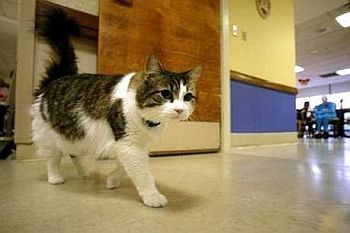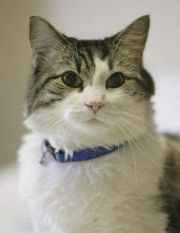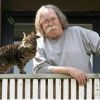
Publisher:
Bonnie King
CONTACT:
Newsroom@Salem-news.com
Advertising:
Adsales@Salem-news.com

~Truth~
~Justice~
~Peace~
TJP
Apr-16-2010 11:31

 TweetFollow @OregonNews
TweetFollow @OregonNews
Oscar the Cat
Daniel Johnson Salem-News.comAn amazing story about a feline with phenomenal abilities.
 Oscar the Cat. Courtesy: SFGate.com |
(CALGARY, Alberta) - “There are more things on heaven and earth, Horatio, than are dreamt of in your philosophy,” said Hamlet after the ghost of his father had come and gone on the battlements.

Oscar the cat lives on the third floor of the Steere House Nursing and Rehabilitation Center in Providence, Rhode Island. When he arrived there in 2005, he appeared to be a typical, playful kitten. But he has turned out to be much more, mysteriously more.
Oscar has the ability to sense imminent death. He has done so, unfailingly in more than 50 instances already.
Oscar first came to worldwide fame after the July 26, 2007 issue of the New England Journal of Medicine, in an essay by the Center’s geriatrician Dr. David M. Dosa. Only two years old, he had already accurately predicted more than 25 deaths. Here is the death of Mrs. K. from the NEJM article:
“Making his way back up the hallway, Oscar arrives at Room 313. The door is open, and he proceeds inside. Mrs. K. is resting peacefully in her bed, her breathing steady but shallow. She is surrounded by photographs of her grandchildren and one from her wedding day. Despite these keepsakes, she is alone. Oscar jumps onto her bed and again sniffs the air. He pauses to consider the situation, and then turns around twice before curling up beside Mrs. K.
”One hour passes. Oscar waits. A nurse walks into the room to check on her patient. She pauses to note Oscar's presence. Concerned, she hurriedly leaves the room and returns to her desk. She grabs Mrs. K.'s chart off the medical-records rack and begins to make phone calls.
”Within a half hour the family starts to arrive. Chairs are brought into the room, where the relatives begin their vigil. The priest is called to deliver last rites. And still, Oscar has not budged, instead purring and gently nuzzling Mrs. K. A young grandson asks his mother, "What is the cat doing here?" The mother, fighting back tears, tells him, "He is here to help Grandma get to heaven." Thirty minutes later, Mrs. K. takes her last earthly breath. With this, Oscar sits up, looks around, then departs the room so quietly that the grieving family barely notices.”
Dr. Dosa expanded that article into a book, Making Rounds With Oscar published last month by Hyperion Books.
How does Oscar do it?
Dr. Dosa says that:
“There is a plausible biological explanation for the ‘sweet smell of death.’ As cells die, carbohydrates are degraded into many different oxygenated compounds, including various types of ketones—chemical mixtures known for their fragrant aroma. Ketones are also found in abundance during episodes of untreated juvenile diabetes and doctors are taught early on in medical school to sniff the breaths of diabetics to determine if their sugar levels are high. Could it be that Oscar simply smells an elevated level of a chemical compound released prior to death? It is certainly clear that animals have a refined sense of smell that goes well beyond that of the ordinary human.”
After the article appeared, he got a phone call from a WW2 vet who had been a medic. He told him that “by the end of the first few months of dragging people off the battlefield, I could tell whether the person was going to live or die. If they were going to die, there was a sweet aroma emanating from their bodies. I didn’t smell it if they were going to live.”
A 2006 study, published in a leading cancer journal, suggested that dogs could be trained to identify microscopic quantities of certain biochemicals excreted by cancer cells on the breaths of lung and breast cancer patients. But it requires training and the dogs don’t seem to do it on their own.
"Death is not a sudden-all-at-once affair,” writes medical essayist Dr. Lewis Thomas, “cells go down in sequence, one by one. You can, if you like, recover great numbers of them many hours after the lights have gone out, and grow them in cultures. It takes hours, even days, before the irreversible word finally gets around to all the provinces."
A Theory
Here’s my theory, for what it’s worth. There are six cats resident at the Steere House and Oscar is unique in what he does. I think that probably all the cats can smell what’s going on, but that for an unknown reason, Oscar is the only one who reacts to it. Actually, that’s not even really a theory, but just pushes the mystery onto another level. Why does Oscar react and none of the others?
There is another aspect to the mystery. Robin was concerned that her father was dying, but they had had no attention at all from Oscar. Not one visit. “My mother and I went looking for him and found him in the opposite hallway sitting with another patient….It was only later that we learned another patient was dying on the other side of the unit,” Robin said. “Oscar stayed with the other patient until he was gone. Then he raced over!”
The question here is: If Oscar is reacting to a smell, can he smell it at a distance? Or, perhaps more likely, he remembers the smell from the other patient and only goes to that patient when he has seen to the one he is with.
In the end (no pun intended), says Dr. Dosa:
“I don’t really pretend to know the nature of Oscar’s special gift—I am not an animal behaviorist nor have I rigorously studied the why and how of his behavior. Whether he is motivated by a refined sense of smell, a special empathy, or something entirely different—your guess is as good as mine. But I believe we can all learn from his example.”
Oscar (cat) - From Wikipedia, the free encyclopedia
 Daniel Johnson was born near the midpoint of the twentieth century in Calgary, Alberta. In his teens he knew he was going to be a writer, which is why he was one of only a handful of boys in his high school typing class — a skill he knew was going to be necessary. He defines himself as a social reformer, not a left winger, the latter being an ideological label which, he says, is why he is not an ideologue. From 1975 to 1981 he was reporter, photographer, then editor of the weekly Airdrie Echo. For more than ten years after that he worked with Peter C. Newman, Canada’s top business writer (notably on a series of books, The Canadian Establishment). Through this period Daniel also did some national radio and TV broadcasting. He gave up journalism in the early 1980s because he had no interest in being a hack writer for the mainstream media and became a software developer and programmer. He retired from computers last year and is now back to doing what he loves — writing and trying to make the world a better place
Daniel Johnson was born near the midpoint of the twentieth century in Calgary, Alberta. In his teens he knew he was going to be a writer, which is why he was one of only a handful of boys in his high school typing class — a skill he knew was going to be necessary. He defines himself as a social reformer, not a left winger, the latter being an ideological label which, he says, is why he is not an ideologue. From 1975 to 1981 he was reporter, photographer, then editor of the weekly Airdrie Echo. For more than ten years after that he worked with Peter C. Newman, Canada’s top business writer (notably on a series of books, The Canadian Establishment). Through this period Daniel also did some national radio and TV broadcasting. He gave up journalism in the early 1980s because he had no interest in being a hack writer for the mainstream media and became a software developer and programmer. He retired from computers last year and is now back to doing what he loves — writing and trying to make the world a better place
Articles for April 15, 2010 | Articles for April 16, 2010 | Articles for April 17, 2010
Quick Links
DINING
Willamette UniversityGoudy Commons Cafe
Dine on the Queen
Willamette Queen Sternwheeler
MUST SEE SALEM
Oregon Capitol ToursCapitol History Gateway
Willamette River Ride
Willamette Queen Sternwheeler
Historic Home Tours:
Deepwood Museum
The Bush House
Gaiety Hollow Garden
AUCTIONS - APPRAISALS
Auction Masters & AppraisalsCONSTRUCTION SERVICES
Roofing and ContractingSheridan, Ore.
ONLINE SHOPPING
Special Occasion DressesAdvertise with Salem-News
Contact:AdSales@Salem-News.com

googlec507860f6901db00.html



Terms of Service | Privacy Policy
All comments and messages are approved by people and self promotional links or unacceptable comments are denied.
JT April 24, 2010 9:20 pm (Pacific time)
I would enjoy the comfort of a warm furry cat purring on my chest as I took my last breath.
Natalie April 19, 2010 4:33 pm (Pacific time)
Smell-of-death-addicted-cat... So, do the nurses try to run when this cat approaches them or he stays politically correct by predicting only their unconscious patients' deaths?
Hank Ruark April 16, 2010 12:09 pm (Pacific time)
Friend Daniel: Your story just denied me early resumption of longtime association with cat-as-pet. Dunno whether to thank you or simply accept as still more increasing disassociations ! Do you suppose cat-tribe can be trained to replace editors, with that highly-discerning, now-recognized ability sensing special-smell...as for some of comments intermittently found here ?
[Return to Top]©2025 Salem-News.com. All opinions expressed in this article are those of the author and do not necessarily reflect those of Salem-News.com.